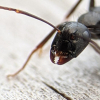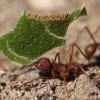Couldn't decide between Formica and Camponotus. Both really large with lots of species and diversity. : )
- Formiculture.com
- Forums
- Gallery
- Members
- Member Map
- Chat
Couldn't decide between Formica and Camponotus. Both really large with lots of species and diversity. : )
I've only seen 6 genus from the list above...
Wait really? I’ve looked in so many acorns, walnuts, and sticks, and I’ve only found Camponotus queens and colonies!
guess I’ll have to try different locations.
Ok I've meant to ask this before as I've seen you catching Camponotus this way. What do you call sticks? I wonder if this would work with Camponotus pennsylvanicus, castaneus, and chromaiodes? Acorns and walnuts too?
Billy
Currently keeping:
Camponotus chromaiodes
Camponotus castaneus
Formica subsericea
So by sticks, I mean like branches! So at the very minimum, 1-2 inches in diameter (preferably 2 in. Because the bigger the better)! I’ve cracked open four of these so far, but have not found pennsylvanicus, castaneus, nor chromiades. For those larger species (as I have only caught subbarbatus and nearcticus, the smaller camponotus’s) you may have to check bigger logs/branches. Sorry that I was misleading with “sticks”, it’s more like “branches”.Ok I've meant to ask this before as I've seen you catching Camponotus this way. What do you call sticks? I wonder if this would work with Camponotus pennsylvanicus, castaneus, and chromaiodes? Acorns and walnuts too?
Wait really? I’ve looked in so many acorns, walnuts, and sticks, and I’ve only found Camponotus queens and colonies!guess I’ll have to try different locations.
Edited by CatsnAnts, May 21 2019 - 2:37 AM.
So by sticks, I mean like branches! So at the very minimum, 1-2 inches in diameter (preferably 2 in. Because the bigger the better)! I’ve cracked open four of these so far, but have not found pennsylvanicus, castaneus, nor chromiades. For those larger species (as I have only caught subbarbatus and nearcticus, the smaller camponotus’s) you may have to check bigger logs/branches. Sorry that I was misleading with “sticks”, it’s more like “branches”.
Ok I've meant to ask this before as I've seen you catching Camponotus this way. What do you call sticks? I wonder if this would work with Camponotus pennsylvanicus, castaneus, and chromaiodes? Acorns and walnuts too?Wait really? I’ve looked in so many acorns, walnuts, and sticks, and I’ve only found Camponotus queens and colonies!
guess I’ll have to try different locations.
Also, for the acorns and walnuts, I’ve just been looking in those to find temnothorax, but have not actually found any Camponotus! I worded that very weird when I said that, whoops!
Very helpful thank you! I'm just wondering if that's a way to find the species I'm looking for. I wouldn't mind finding Nearticus myself but I don't think they are very common here.
Billy
Currently keeping:
Camponotus chromaiodes
Camponotus castaneus
Formica subsericea
Anting →
Ant ID Requests →
Westville, KZN, South Africa - 21 October 2025 - small, red, big eyes, dropped tail.Started by JakeWilliamson , Oct 21 2025 |
|

|
||
Market Place →
Ant Gear (antgear.com) →
AntGear review 5-stars!Started by cooIboyJ , Oct 18 2025 |
|

|
||
Ant ID Western Henderson NVStarted by cooIboyJ , Sep 4 2025 |
|

|
||
Ant Keeping →
Ant Keeping Journals →
P. CalifornicusStarted by kenonical , Jul 22 2025 |
|

|
||
Ant Keeping →
General Ant Keeping →
Care guide for Pachycondyla Harpax?Started by Moldy_Leafcutter , May 15 2025 |
|

|
0 members, 1 guests, 0 anonymous users